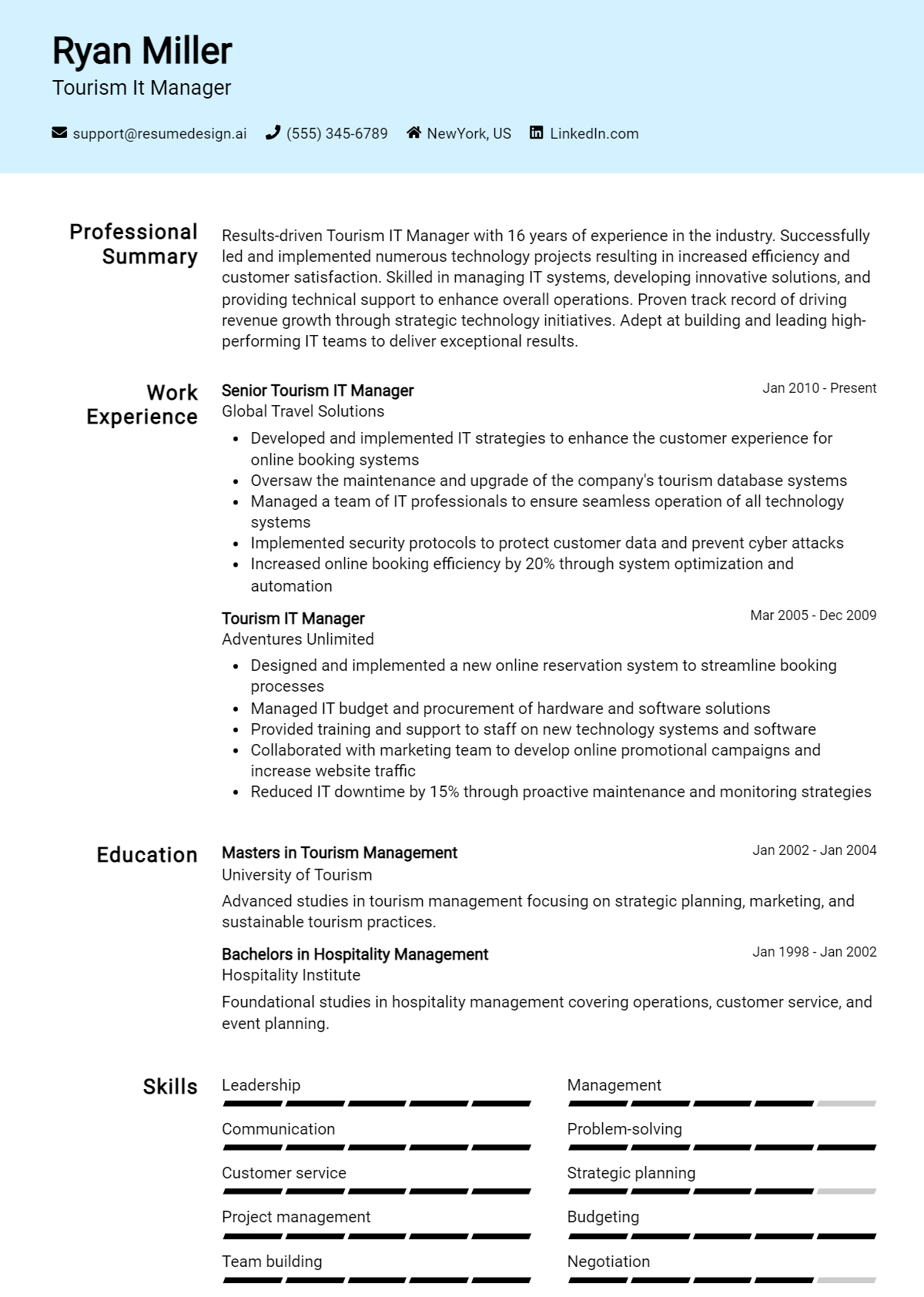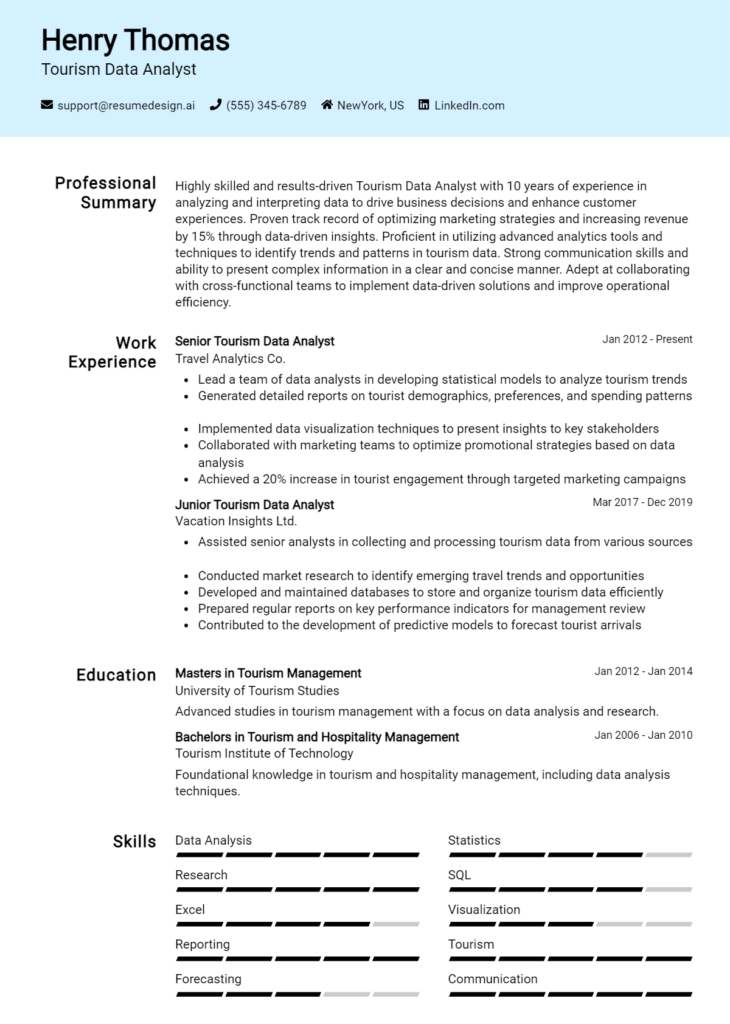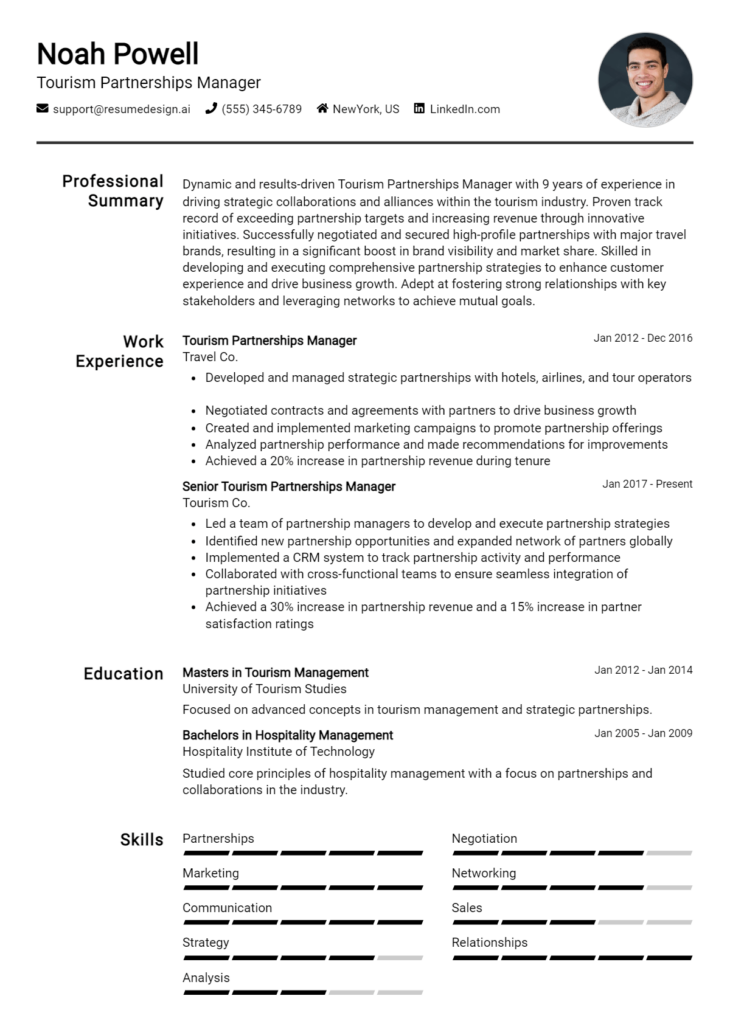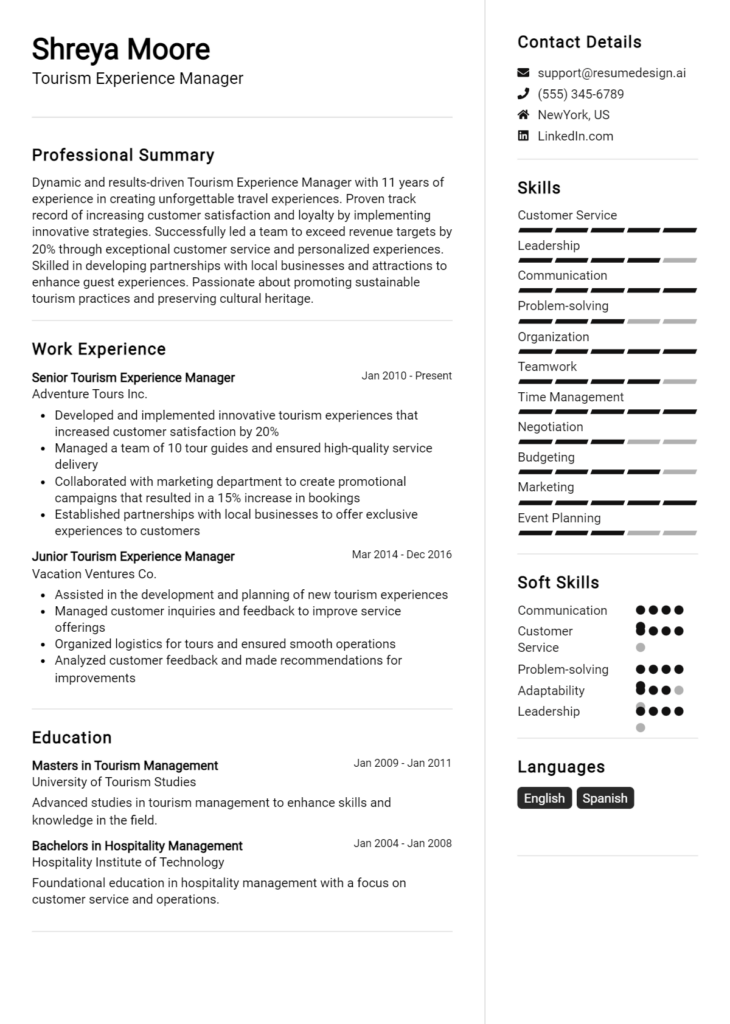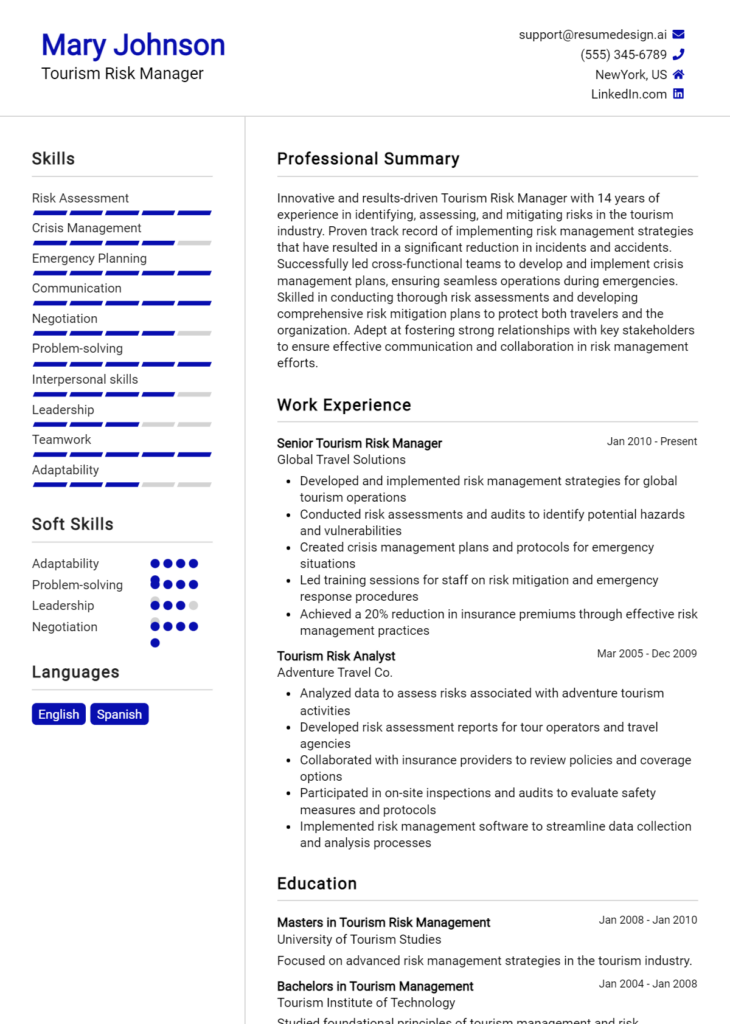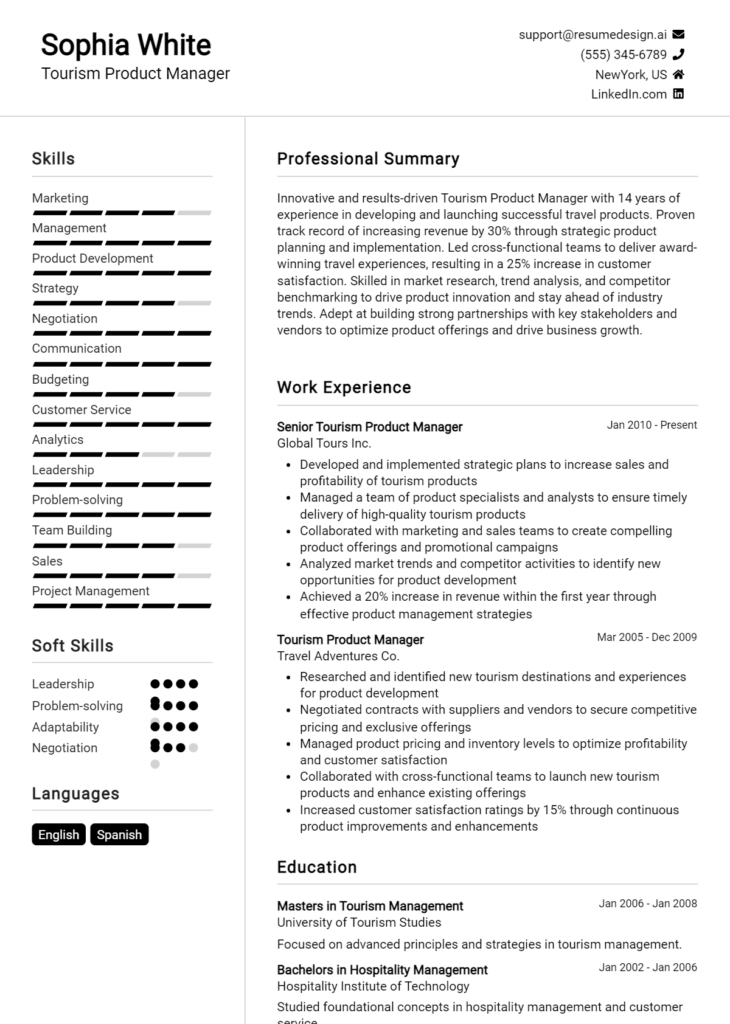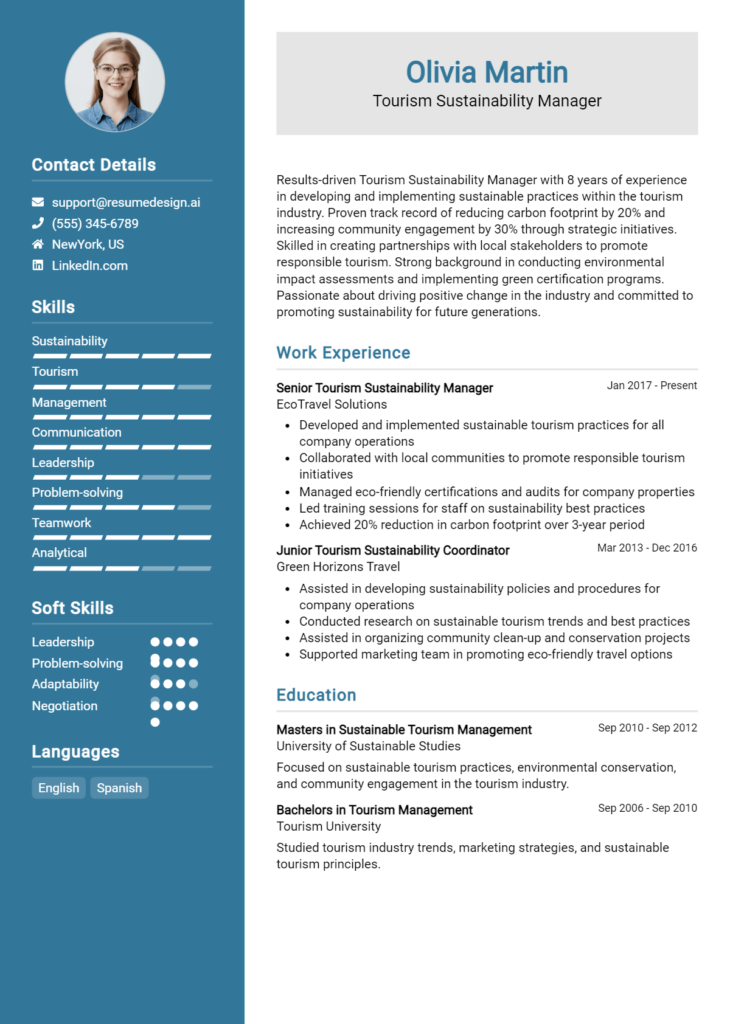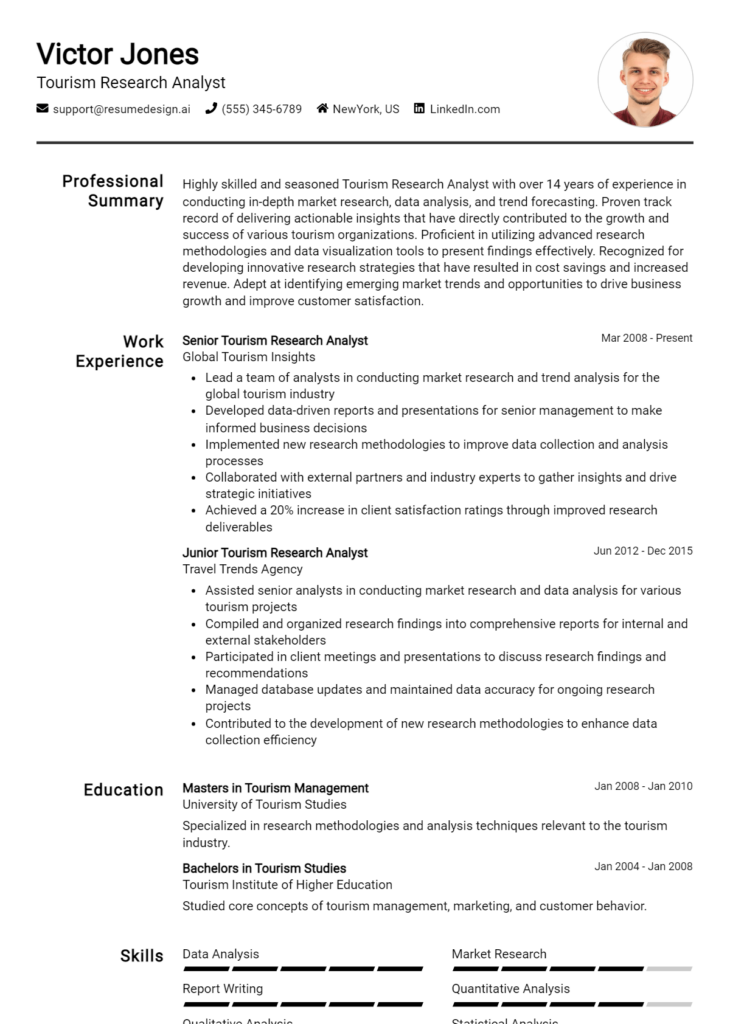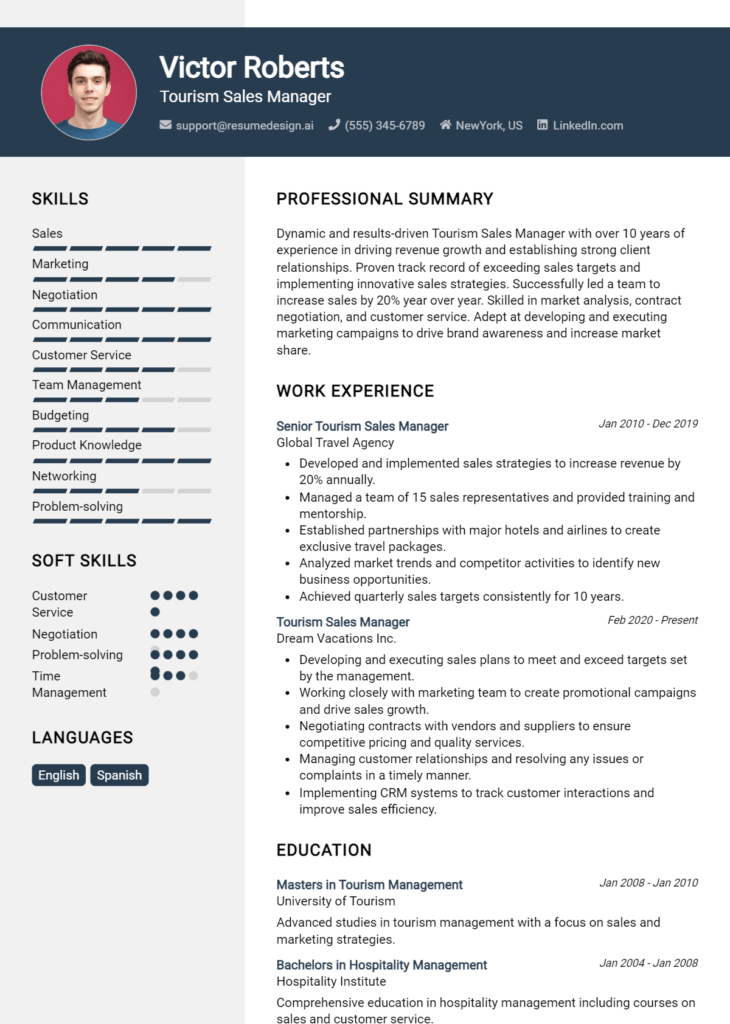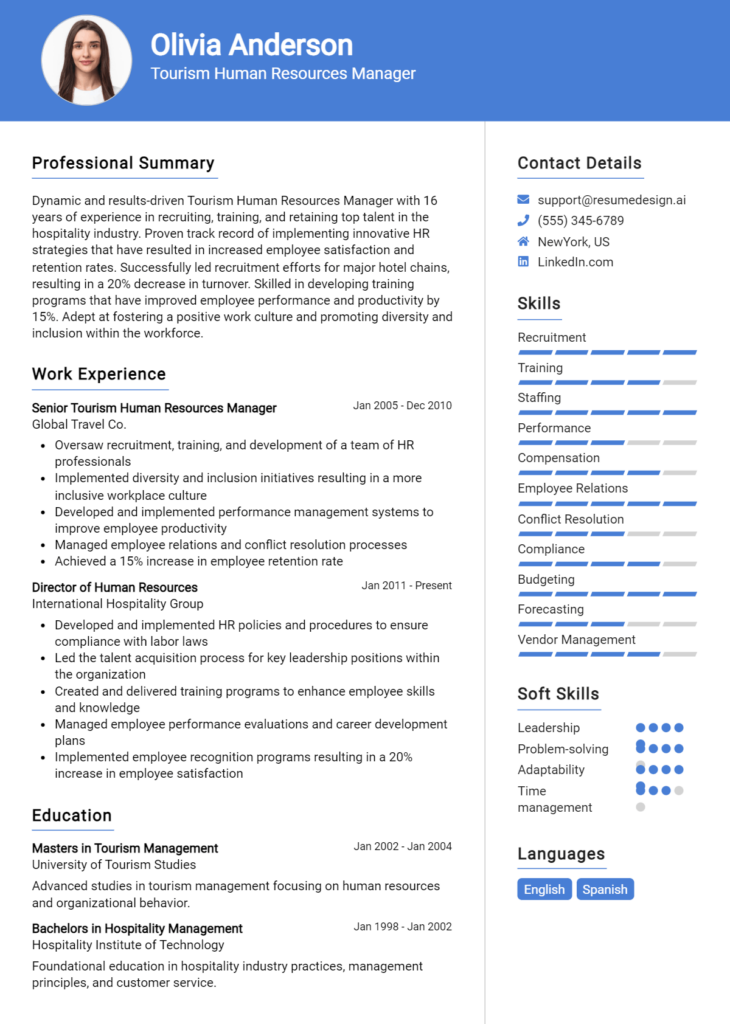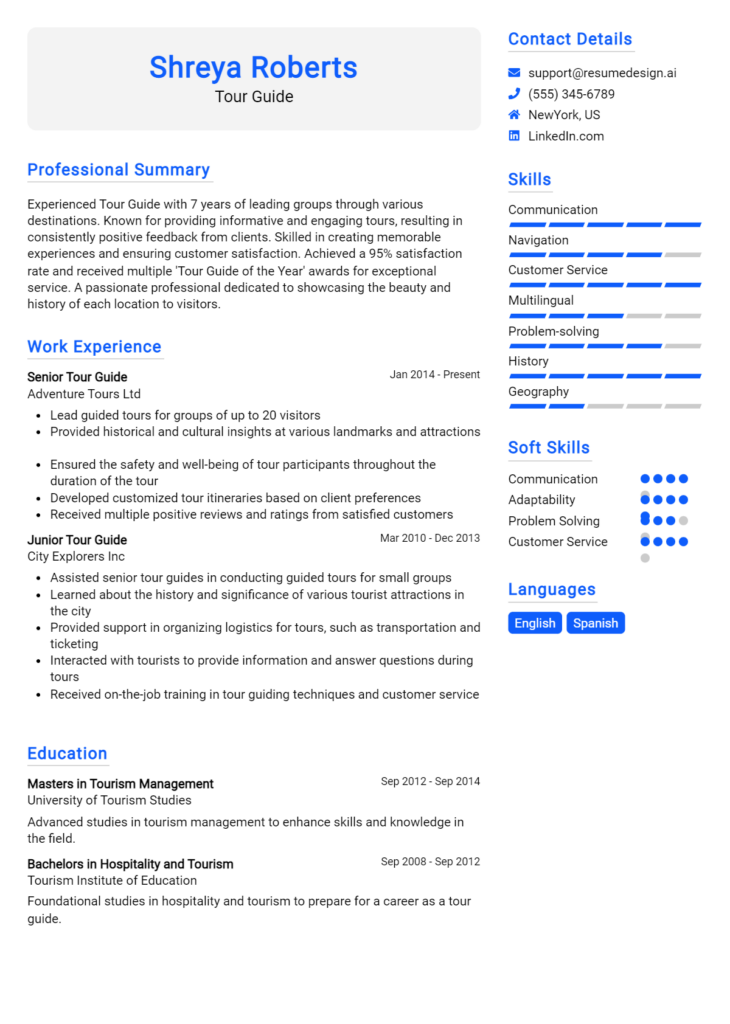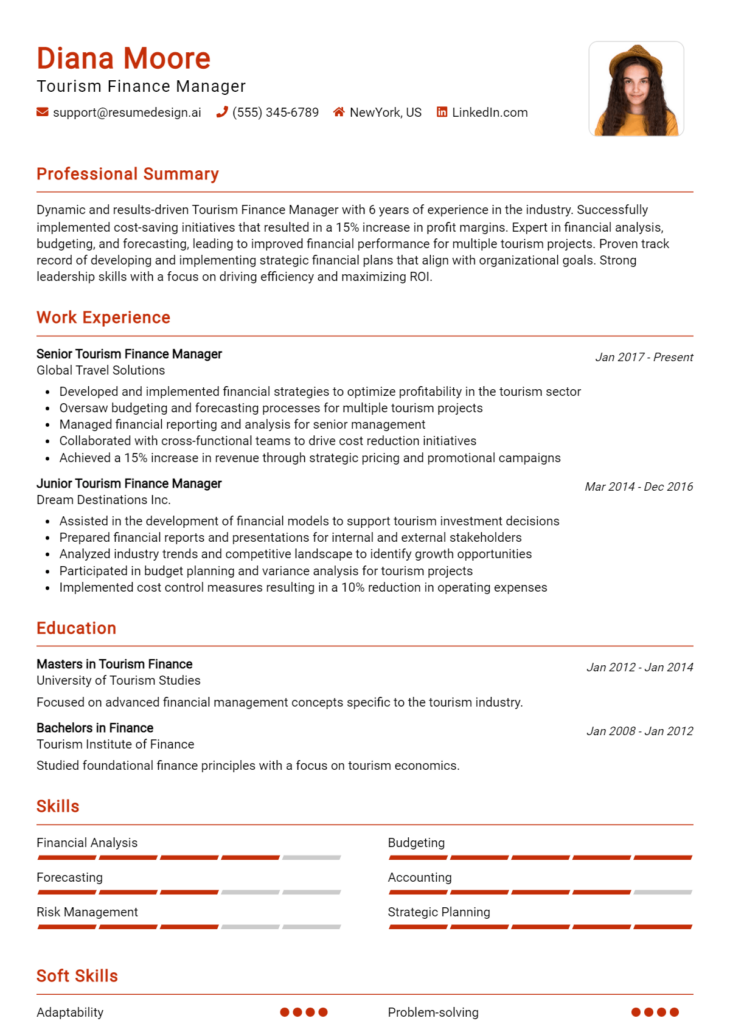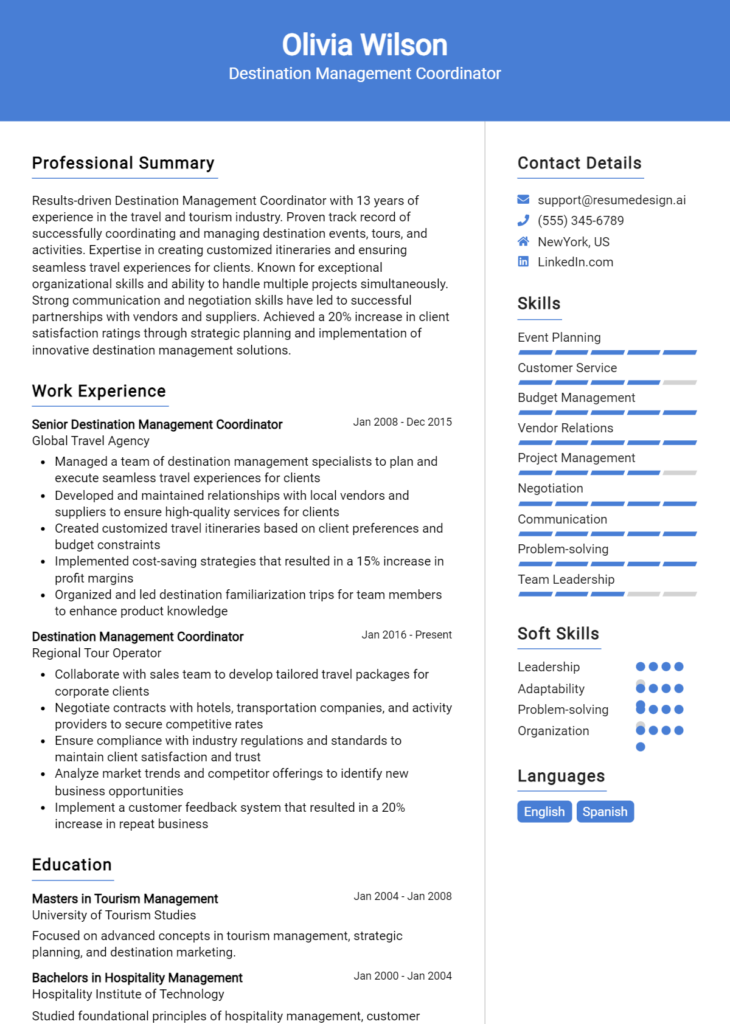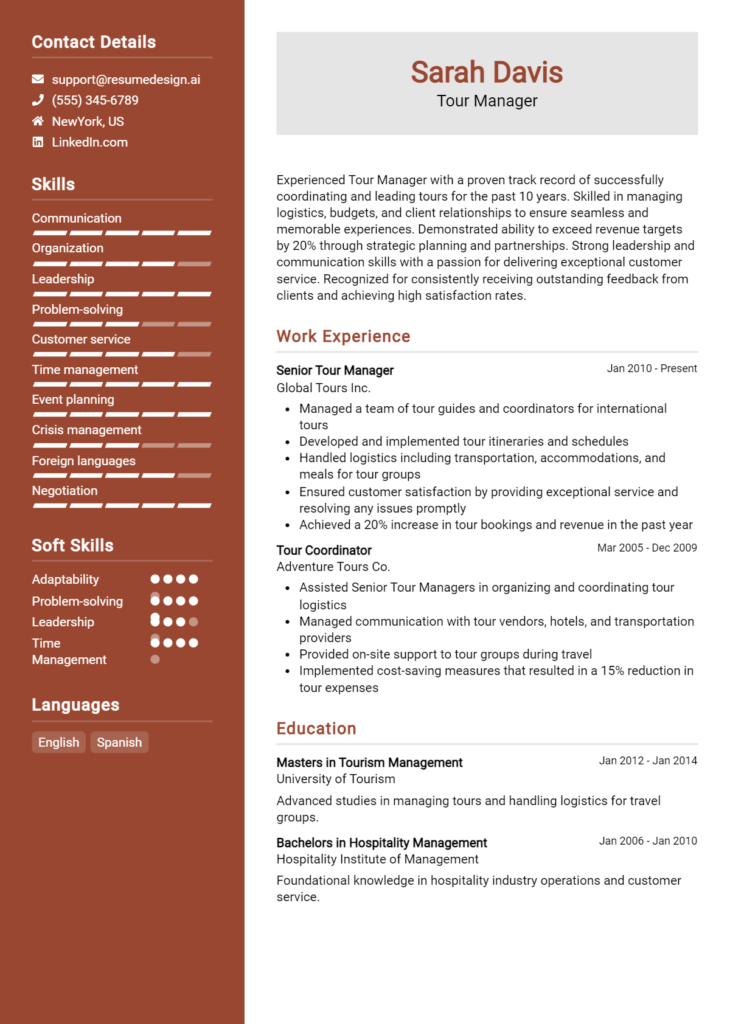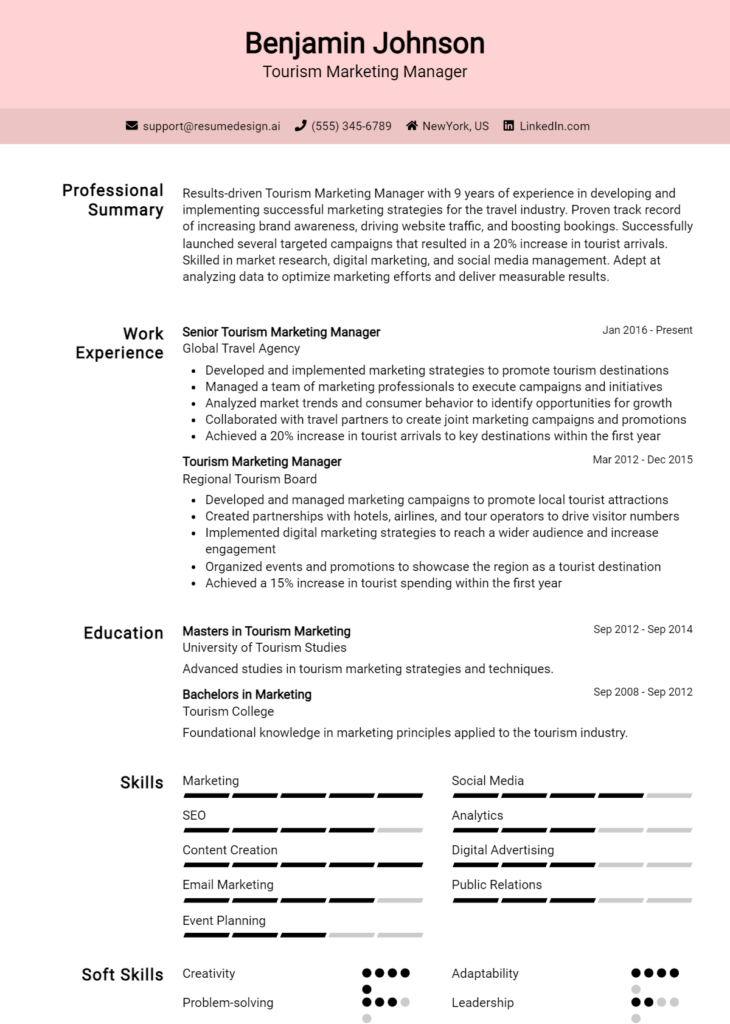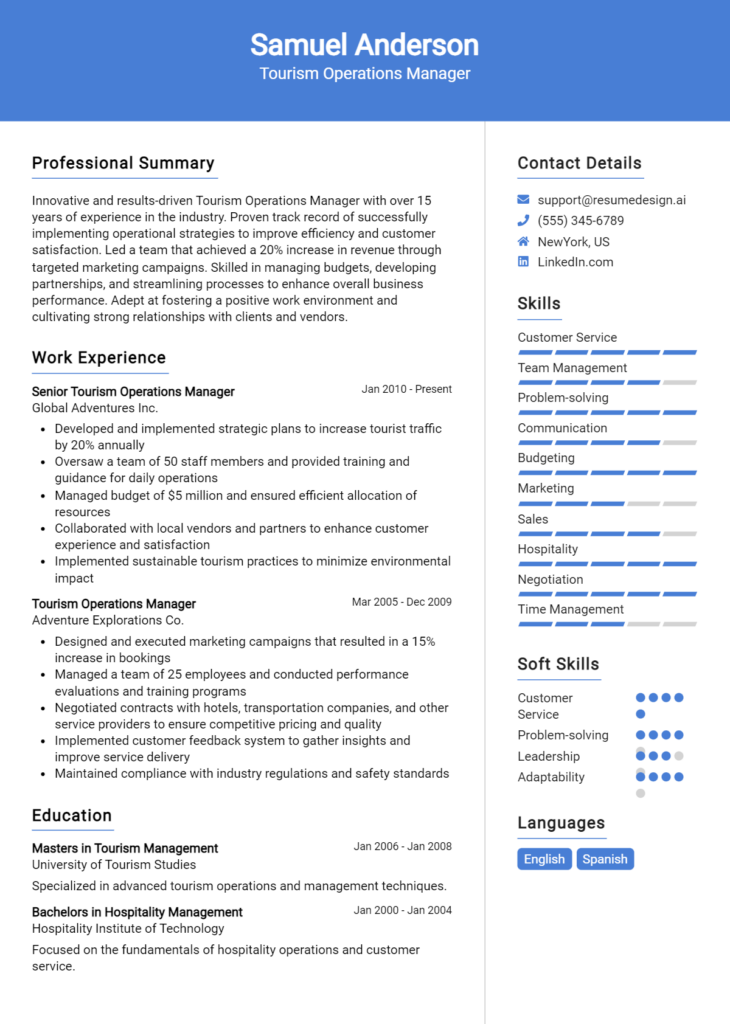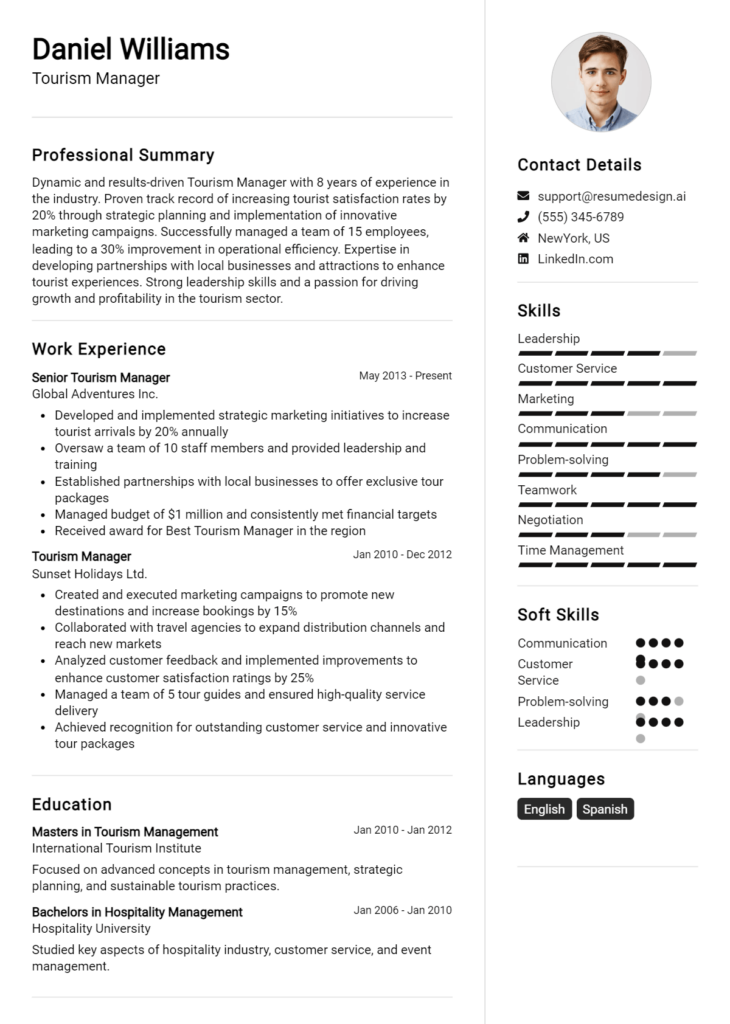Tourism IT Manager Core Responsibilities
A Tourism IT Manager is essential in harmonizing technology with the travel and hospitality sectors. This role requires a blend of technical expertise, operational insight, and strong problem-solving skills to manage IT infrastructure and support various departments, such as marketing, customer service, and operations. By ensuring seamless communication and data flow, the manager contributes to the organization’s strategic goals. A well-crafted resume can effectively highlight these qualifications, showcasing the candidate's ability to drive technology initiatives that enhance guest experiences and operational efficiency.
Common Responsibilities Listed on Tourism IT Manager Resume
- Oversee the development and maintenance of IT systems in tourism operations.
- Collaborate with marketing teams to implement digital marketing tools and strategies.
- Manage software applications for booking, customer relationship management, and inventory.
- Ensure data security and compliance with relevant regulations.
- Conduct regular system audits and performance assessments.
- Provide technical support and training for staff across departments.
- Evaluate emerging technologies to enhance customer experiences.
- Develop and manage IT budgets for tourism projects.
- Coordinate with external vendors for IT services and solutions.
- Implement disaster recovery and business continuity plans.
- Analyze data to inform strategic decisions and improve operational efficiency.
High-Level Resume Tips for Tourism IT Manager Professionals
A well-crafted resume is crucial for Tourism IT Manager professionals, as it often serves as the first impression a candidate makes on potential employers. In a competitive field where technology and tourism intersect, your resume needs to effectively showcase both your technical skills and your achievements in managing IT solutions within the tourism sector. An impactful resume not only highlights your qualifications but also reflects your understanding of the industry and its unique challenges. This guide will provide practical and actionable resume tips specifically tailored for Tourism IT Manager professionals, ensuring you stand out in the job market.
Top Resume Tips for Tourism IT Manager Professionals
- Tailor your resume to the job description by incorporating relevant keywords that match the requirements listed in the job posting.
- Highlight your experience in managing IT systems specifically for the tourism industry, emphasizing your understanding of industry-specific software and tools.
- Quantify your achievements by including metrics such as increased efficiency, reduced costs, or improved customer satisfaction that resulted from your IT initiatives.
- Showcase your technical skills, including proficiency in travel management systems, data analytics, and cybersecurity measures relevant to the tourism sector.
- Include relevant certifications or training that demonstrate your commitment to staying updated with the latest technologies and trends in tourism IT.
- Utilize a clear and professional format that enhances readability, making it easy for employers to quickly identify key information.
- Incorporate a summary statement at the top of your resume that encapsulates your experience, skills, and what you bring to a potential employer in the tourism industry.
- Leverage your soft skills, such as communication and problem-solving abilities, that are essential for successfully managing IT teams and collaborating with other departments.
- Consider including a section dedicated to notable projects or achievements that demonstrate your impact in previous roles, particularly in enhancing guest experiences or operational efficiency.
By implementing these tips, you can significantly increase your chances of landing a job in the Tourism IT Manager field. A well-optimized resume not only captures the attention of hiring managers but also positions you as a qualified candidate who understands the intersection of technology and tourism.
Why Resume Headlines & Titles are Important for Tourism IT Manager
In the competitive field of tourism IT management, a well-crafted resume headline or title serves as a crucial first impression for hiring managers. These headlines encapsulate a candidate’s key qualifications and set the tone for the entire resume. A strong headline can immediately grab the attention of potential employers, succinctly summarizing the applicant's expertise and relevance to the job. By being concise, relevant, and directly related to the position being applied for, an impactful headline ensures that the candidate stands out in a crowded applicant pool and encourages hiring managers to delve deeper into their qualifications.
Best Practices for Crafting Resume Headlines for Tourism IT Manager
- Keep it concise: Aim for a headline that is no longer than one or two lines.
- Be role-specific: Tailor the headline to highlight your expertise in tourism IT management.
- Highlight key strengths: Include your most relevant skills or accomplishments in the headline.
- Use industry-specific language: Incorporate terminology and keywords that are commonly recognized in the tourism IT sector.
- Avoid jargon: Ensure your headline is easily understandable and free from overly technical terms.
- Showcase unique selling points: Emphasize what sets you apart from other candidates.
- Make it impactful: Use strong action words that convey confidence and capability.
- Align with job description: Reflect the requirements and expectations outlined in the job posting.
Example Resume Headlines for Tourism IT Manager
Strong Resume Headlines
"Results-Driven Tourism IT Manager with 10+ Years of Experience in Digital Transformation"
“Innovative IT Strategist Specializing in Enhancing Guest Experiences through Technology”
“Proven Leader in Tourism IT Solutions with a Track Record of Boosting Operational Efficiency”
Weak Resume Headlines
“IT Manager”
“Seeking Opportunities in IT”
The strong resume headlines effectively communicate the candidate's relevant experience, unique strengths, and specific focus within the tourism IT sector, setting a positive tone for the rest of the resume. In contrast, the weak headlines lack specificity and fail to convey any meaningful information about the candidate’s qualifications or aspirations, making them easy to overlook in a competitive job market. A compelling headline is essential for drawing attention and encouraging hiring managers to learn more about the candidate's abilities and fit for the role.
Writing an Exceptional Tourism IT Manager Resume Summary
A resume summary is a crucial component for a Tourism IT Manager, as it serves as the first impression to potential employers. This concise overview captures the essence of the candidate's expertise, showcasing relevant skills, experiences, and accomplishments that align with the specific demands of the job. A well-crafted summary quickly engages hiring managers, making it easier for them to envision the candidate's fit for the role. Therefore, it is essential that this section is impactful and tailored to reflect the unique qualifications of the applicant, setting the stage for a compelling resume.
Best Practices for Writing a Tourism IT Manager Resume Summary
- Quantify Achievements: Use numbers and metrics to illustrate the impact of your work, such as increased revenue percentages or improved system efficiencies.
- Focus on Skills: Highlight key technical and managerial skills relevant to the tourism industry, such as software proficiency, project management, and customer service capabilities.
- Tailor for the Job Description: Customize your summary to reflect the specific requirements and keywords found in the job listing.
- Be Concise: Keep your summary brief, ideally between 3 to 5 sentences, ensuring every word adds value.
- Showcase Relevant Experience: Emphasize previous roles and projects that directly relate to tourism and IT management.
- Demonstrate Leadership: Mention any leadership roles or initiatives that showcase your ability to manage teams and projects effectively.
- Include Certifications: If applicable, highlight any relevant certifications or educational achievements that enhance your qualifications.
Example Tourism IT Manager Resume Summaries
Strong Resume Summaries
Results-driven Tourism IT Manager with over 8 years of experience enhancing technology infrastructure for leading travel agencies. Successfully led a project that improved booking system efficiency by 35%, resulting in a 20% increase in customer satisfaction metrics.
Innovative IT professional with a proven track record in the tourism industry, managing a team of 10 to implement a new CRM system that boosted client retention rates by 25% within the first year. Adept at leveraging technology to streamline operations and enhance user experience.
Dynamic Tourism IT Manager with expertise in e-commerce solutions, achieving a 40% increase in online bookings through strategic website enhancements and digital marketing initiatives. Strong analytical skills drive data-informed decision-making.
Weak Resume Summaries
Experienced IT manager looking for opportunities in the tourism sector. Familiar with various technologies and project management.
Tourism IT Manager with some experience in the field. Interested in using my skills to contribute to a team.
The examples of strong resume summaries demonstrate clear, quantifiable achievements and specific skills relevant to the Tourism IT Manager role, effectively capturing the candidate's capabilities and experiences. In contrast, the weak summaries lack detail and fail to provide concrete examples or measurable outcomes, making it difficult for hiring managers to assess the candidate's qualifications accurately.
Work Experience Section for Tourism IT Manager Resume
The work experience section of a Tourism IT Manager resume is crucial as it provides potential employers with insights into the candidate's technical skills, leadership abilities, and capacity to deliver high-quality products within the tourism sector. This section not only highlights specific roles and responsibilities but also demonstrates the candidate's proficiency in managing teams and projects effectively. By quantifying achievements and aligning experiences with industry standards, candidates can create a compelling narrative that showcases their value to prospective employers.
Best Practices for Tourism IT Manager Work Experience
- Emphasize technical skills relevant to tourism technology, such as system integration and data analytics.
- Quantify achievements with metrics, such as reduced downtime by X% or increased user satisfaction scores.
- Highlight leadership roles and team management experiences to showcase your ability to lead diverse teams.
- Align experiences with industry standards and best practices to demonstrate your knowledge of the tourism sector.
- Include examples of successful project management, detailing the scope, budget, and outcomes.
- Showcase collaboration with other departments, such as marketing and customer service, to illustrate your ability to work cross-functionally.
- Use action verbs to convey a sense of initiative and impact in your roles.
- Tailor your experience section for each job application to match the requirements of the role you are applying for.
Example Work Experiences for Tourism IT Manager
Strong Experiences
- Led a cross-functional team in the implementation of a new booking system, resulting in a 30% increase in online reservations within six months.
- Developed a data analytics dashboard that improved decision-making, leading to a 15% reduction in operational costs year-over-year.
- Managed a team of 10 IT professionals to upgrade cybersecurity measures, resulting in a 40% decrease in security incidents.
- Collaborated with marketing teams to create an integrated CRM solution, enhancing customer engagement and increasing repeat business by 25%.
Weak Experiences
- Responsible for various IT tasks in the tourism department.
- Worked on some projects, but didn’t track outcomes or results.
- Assisted with technology issues as needed.
- Participated in team meetings occasionally.
The examples provided illustrate the distinction between strong and weak experiences in a resume. Strong experiences are characterized by specific achievements, quantifiable results, and clear descriptions of leadership and collaboration, making a compelling case for the candidate's capabilities. Conversely, weak experiences lack detail and measurable outcomes, failing to convey the candidate's contributions effectively. This comparison emphasizes the importance of articulating one’s experience in a way that highlights value and impact in the role of a Tourism IT Manager.
Education and Certifications Section for Tourism IT Manager Resume
The education and certifications section of a Tourism IT Manager resume plays a pivotal role in showcasing a candidate’s academic qualifications and professional training relevant to the industry. This section not only highlights the candidate's foundational knowledge gained through formal education but also underscores their commitment to continuous learning through industry-recognized certifications and specialized training. By providing pertinent coursework, certifications, and evidence of ongoing professional development, candidates can significantly enhance their credibility and demonstrate alignment with the demands of the Tourism IT Manager role.
Best Practices for Tourism IT Manager Education and Certifications
- Focus on relevant degrees such as IT, Tourism Management, or Business Administration.
- List industry-recognized certifications such as Certified Information Systems Security Professional (CISSP) or Project Management Professional (PMP).
- Include specialized training programs or workshops that pertain to tourism technology or systems.
- Highlight any continuing education courses or online certifications related to emerging technologies in tourism.
- Present your educational achievements in reverse chronological order to emphasize recent qualifications.
- Be specific about your coursework if it directly relates to tourism or IT management.
- Ensure all certifications are current and relevant to the job role.
- Avoid including irrelevant or outdated qualifications that do not support your candidacy.
Example Education and Certifications for Tourism IT Manager
Strong Examples
- Bachelor of Science in Information Technology, University of ABC, 2018
- Certified Information Systems Manager (CISM), 2022
- Digital Marketing and eCommerce Strategies, Online Course, 2021
- Master's Degree in Tourism Management, University of XYZ, 2020
Weak Examples
- Associate Degree in General Studies, 2010
- Certification in Basic Computer Skills, 2015
- High School Diploma, 2008
- Old certification in Microsoft Office Suite, 2014
The strong examples provided are considered valuable as they directly relate to both IT and tourism, showcasing a blend of relevant education and certifications that align with the role of a Tourism IT Manager. They reflect current industry standards and illustrate a commitment to professional growth. Conversely, the weak examples are less impactful because they either represent outdated or irrelevant qualifications that do not support the desired career trajectory in the tourism IT field.
Top Skills & Keywords for Tourism IT Manager Resume
As the tourism industry increasingly relies on technology to enhance customer experiences and streamline operations, the role of a Tourism IT Manager has become crucial. A well-crafted resume for this position should highlight a blend of both hard and soft skills that demonstrate the candidate's technical competency and interpersonal effectiveness. Skills not only showcase a candidate's qualifications but also help potential employers gauge their ability to contribute to the organization's goals. With the right combination of expertise in IT and an understanding of the tourism sector, a Tourism IT Manager can lead teams in implementing innovative solutions and ensuring seamless technological integration.
Top Hard & Soft Skills for Tourism IT Manager
Soft Skills
- Excellent communication skills
- Problem-solving abilities
- Team leadership and collaboration
- Customer service orientation
- Adaptability and flexibility
- Time management
- Critical thinking
- Project management
- Conflict resolution
- Creativity and innovation
Hard Skills
- Proficiency in IT systems and software (e.g., CRM, PMS)
- Knowledge of data analytics and reporting tools
- Familiarity with cybersecurity measures
- Understanding of web development technologies
- Experience in managing IT infrastructure
- Skills in database management
- Knowledge of cloud computing
- Proficient in mobile application development
- Understanding of digital marketing strategies
- Experience with vendor management and procurement
For more details on essential skills and how to effectively showcase your work experience, consider exploring additional resources that can enhance your resume and improve your chances of landing the Tourism IT Manager role.
Stand Out with a Winning Tourism IT Manager Cover Letter
Dear [Hiring Manager's Name],
I am excited to apply for the Tourism IT Manager position at [Company Name] as advertised on [Job Board/Company Website]. With a robust background in information technology and a passion for the tourism industry, I am well-equipped to enhance the technological framework of your organization. My experience in managing IT projects, coupled with my commitment to delivering exceptional customer experiences, aligns perfectly with the goals of your company.
In my previous role at [Previous Company Name], I successfully implemented a new booking system that improved efficiency by 30% and significantly enhanced user experience for our clients. My ability to analyze complex systems and identify opportunities for improvement has allowed me to lead cross-functional teams in deploying technology solutions tailored to the needs of travelers and industry stakeholders. I am skilled in utilizing data analytics to drive decision-making and optimize operations, ensuring that IT strategies align with organizational objectives.
Moreover, my expertise in cybersecurity and data management is crucial in today’s digital landscape. I understand the importance of protecting sensitive customer information while ensuring compliance with industry regulations. My proactive approach to IT management not only mitigates risks but also fosters a culture of innovation within the team. I am eager to contribute my technical skills and leadership abilities to [Company Name] to further its mission of providing exceptional travel experiences through cutting-edge technology.
I look forward to the opportunity to discuss how my background and vision for technology in tourism can contribute to the ongoing success of [Company Name]. Thank you for considering my application. I am excited about the possibility of joining your team and am available for an interview at your earliest convenience.
Sincerely,
[Your Name]
[Your LinkedIn Profile]
[Your Contact Information]
Common Mistakes to Avoid in a Tourism IT Manager Resume
A well-crafted resume is essential for a Tourism IT Manager, as it serves as the first impression to potential employers. However, many candidates make common mistakes that can diminish their chances of landing an interview. Avoiding these pitfalls can significantly enhance the effectiveness of your resume and showcase your qualifications in the best light. Here are some common mistakes to steer clear of:
Generic Objective Statement: Using a vague or generic objective can make your resume blend in with others. Tailor your objective to reflect your specific goals and how they align with the role of a Tourism IT Manager.
Neglecting Technical Skills: Failing to highlight relevant technical skills can be detrimental, especially in a field that relies heavily on technology. Be sure to include specific IT skills, software proficiencies, and any relevant certifications.
Overloading with Jargon: While industry terminology is important, overloading your resume with jargon can alienate hiring managers. Strive for a balance that demonstrates your expertise without overwhelming the reader.
Ignoring Metrics and Achievements: Simply listing responsibilities without showcasing achievements can make your experience seem less impactful. Use metrics to quantify your accomplishments, such as improvements in system efficiency or successful project completions.
Inconsistent Formatting: A disorganized or inconsistent format can distract from the content of your resume. Use a clean, professional layout with consistent fonts, bullet points, and spacing to enhance readability.
Lack of Tailoring for Each Application: Sending out a one-size-fits-all resume can be a major oversight. Customize your resume for each application by emphasizing the experience and skills most relevant to the specific job description.
Excessive Length: A lengthy resume can overwhelm hiring managers, especially if it includes irrelevant information. Aim for a concise format, ideally one to two pages, focusing only on the most pertinent details.
Omitting Soft Skills: While technical skills are crucial, soft skills like communication, leadership, and problem-solving are equally important for a Tourism IT Manager. Be sure to highlight these attributes in your experience or skills section.
Conclusion
As we wrap up our exploration of the vital role of a Tourism IT Manager, it's clear that this position requires a unique blend of technical expertise, project management skills, and an understanding of the tourism industry. Key responsibilities include managing IT systems that enhance the customer experience, ensuring data security, and implementing innovative technologies that drive efficiency and growth within tourism organizations.
Given the evolving landscape of technology in tourism, it's essential to stay updated with the latest trends and tools. A well-crafted resume is crucial for showcasing your skills and experiences effectively in this competitive field.
We encourage you to take a moment to review your Tourism IT Manager resume. Make sure it reflects your accomplishments and aligns with the demands of this dynamic role. To assist you in this process, consider using the following resources:
- Explore a variety of resume templates to find a design that suits your style.
- Utilize a resume builder to create a polished and professional document effortlessly.
- Check out resume examples for inspiration on how to highlight your qualifications effectively.
- Don’t forget to craft a compelling cover letter using our cover letter templates to accompany your resume.
Taking these steps will help you stand out in the job market and secure your desired position as a Tourism IT Manager. Start enhancing your resume today!

